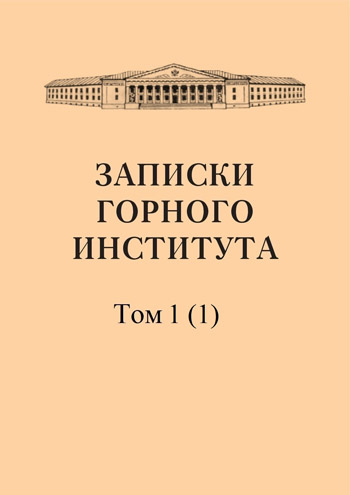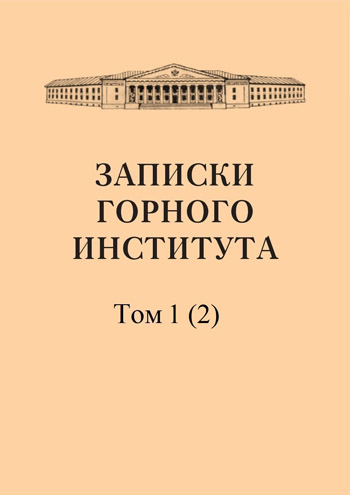-
Date submitted1907-06-21
-
Date accepted1907-08-19
-
Date published1907-12-01
Chemical relations of rocks and their graphic representation
- Authors:
- Ye. S. Fedorov
Whoever sought to give himself a clear account of the chemical relations of rocks had to see with amazing clarity all the imperfections of our information on this issue. We have to admit that real, exact science has hardly yet touched upon this important issue, and the most primitive empiricism reigns here. A large number of types of rocks are exhibited, receiving numerous names, but there is not even a generally accepted criterion for distinguishing one type, or, more precisely, a type of rock from another.
-
Date submitted1907-06-21
-
Date accepted1907-08-15
-
Date published1907-12-01
Precise image of points in space on a plane
- Authors:
- Ye. S. Fedorov
If there is a parallelism between the theorems of geometry of the points in space and the circles on the plane, then the idea of the possibility of accurately representing points (and, consequently, images obtained from points of other images) of space by circles on the plane naturally arises. The purpose of this article is to develop the most perfect and simple way of depicting such an image. However, in addition this article introduces two new geometric systems that are also used for the same purpose, namely, the system of vectorial circles and the system of vectorial segments or simply vectors.
-
Date submitted1907-06-29
-
Date accepted1907-08-27
-
Date published1907-12-01
Calomel from Nikitovka
- Authors:
- Ye. S. Fedorov
A.E. Kupfer brought from a well-known mercury deposit pieces of light burnt (and therefore reddened) sandstone, covered with thin crystalline crusts. The crystals are thin-columnar, completely colorless, with a diamond luster and in general look very similar to calomel. However, the on-site analysis, having stated the presence of chlorine and mercury, gave an insufficient amount of chlorine, which is why it was assumed that these were not calomel, but crystals of some other mercury chloride. In these cases, the decisive methods are the usual methods of crystal-chemical analysis reduced to measuring the crystals and their correct installation
-
Date submitted1907-06-10
-
Date accepted1907-08-18
-
Date published1907-12-01
Crystals of dinitrobromobenzene C6H3Br(N02)2 and an isomorphous 50% mixture of C6H3Br(NO2)2 and C6H3Cl(NO2)2
- Authors:
- A. K. Boldyrev
The named crystals were given to me for crystallographic study by Professor N.S. Kurnakov, who obtained them for the first time. The author carried out: goniometric studies, optical studies and studies of crystal isomorphism. See the article for results and pictures.
-
Date submitted1907-06-24
-
Date accepted1907-08-17
-
Date published1907-12-01
Deriving one of the basic formulas of the doctrine of symmetry
- Authors:
- Ye. S. Fedorov
The formula in question here is a logical consequence of two already known formulas, which were given in full by the author of the doctrine of symmetry, namely in the part that was published under the title “Symmetry of Finite Figures.” The formula, applicable to any group of symmetry axes (type of alignment symmetry), but of course not applicable to one axis taken separately, makes it possible to directly derive the value of symmetry from the number of symmetry axes. From it, by the way, it follows that the value of the symmetry of the combination is certainly even (which is understandable, in view of the obligatory presence of double axes of symmetry in the aggregates), and therefore the value of the symmetry of those types where, in addition to the axes of symmetry, the elements of direct symmetry are also included, is certainly divided by four.
-
Date submitted1907-06-24
-
Date accepted1907-08-13
-
Date published1907-12-01
On the issue of faults, strike-slips and other displacements of veins and layers
- Authors:
- V. I. Bauman
Recently there has been some revival in the literature on faults and other displacements of layers and veins, and this revival concerns even the purely geometric side of the issue, which seemed to be completely exhausted. We propose another conclusion of crossings and from them faults, re-faults and other displacements, in which these latter are arranged in a row in decreasing or increasing order of the formation doublings present in them, from which, as a consequence, follows the determination of the shortest and most convenient routes for exploration of the dropped part of the formation. Along the way, we will have to touch on the modern, extremely imperfect in the geometric sense, terminology and classification of faults and other displacements."
-
Date submitted1907-06-06
-
Date accepted1907-08-29
-
Date published1907-12-01
Some new devices and techniques of the universal optical research method
- Authors:
- V. V. Nikitin
The purpose of this short note is to publish several new devices and techniques that I introduced during my work on the universal optical (in common speech Fedorovsky) method of microscopic research and which have been already recognized by persons who use this method in their work: 1) segments in a metal frame; 2) rotating comparator; 3) measuring the thickness of a thin section using cracks and inclusions in it by tilting the specimen; 4) hemisphere for graphic solutions to problems of the universal optical research method.
-
Date submitted1907-06-29
-
Date accepted1907-08-29
-
Date published1907-12-01
Experiments that clearly demonstrate significant differences in the solubility of different faces
- Authors:
- Ye. S. Fedorov
Although at present there is hardly any disagreement between specialists on the issue indicated in the title, it still seems impossible to point to direct experience that imediately resolves this issue beyond any doubt. Concerned about this form of experience, I focused on such a simple and convincing one that I can consider the goal achieved. According to the idea that was developed in my article “Observations and Experiments on Crystallogenesis,” solubility in relation to each face of a crystalline substance is directly proportional to its network density, and therefore, the more complex the symbol of the observed face (with the correct installation of the crystal), the smaller it is, and for irrational faces it is even equal to zero.
-
Date submitted1907-06-09
-
Date accepted1907-08-05
-
Date published1907-12-01
On the growth of crystals cut into the shape of spheres
- Authors:
- D. N. Artemyev
When studying certain physical properties of crystals, it is often advantageous to operate with crystals turned into spheres, since in this case we directly obtain the specific magnitude of change for each vector. However, as far as I know, no experiments have ever been made on the crystallization of spheres artificially prepared from a crystal of a given solid substance. Meanwhile, this form of crystal is important in the sense of reducing the influence of crystal planes on the crystallization currents that arise during the deposition of a substance from a solution.

